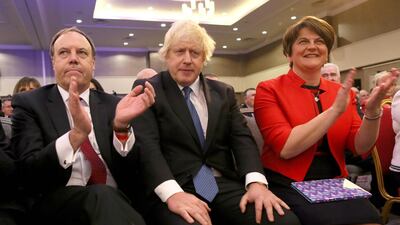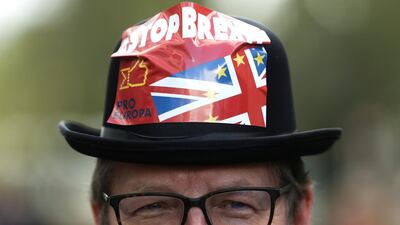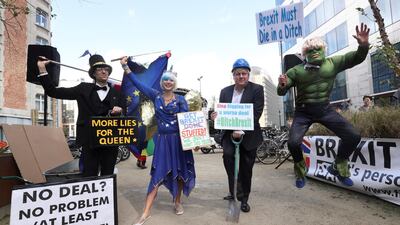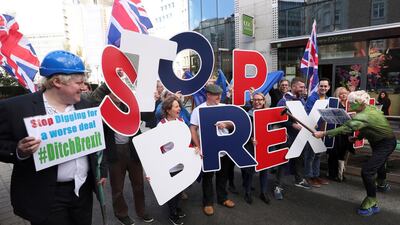UK Prime Minister Boris Johnson returned to London on Friday to convince MPs to back his Brexit deal ahead of a parliamentary vote.
However, he appears to be facing a losing battle with his Conservative Party allies, the Democratic Unionist Party (DUP).
The Northern Irish party agreed to support Theresa May’s government after she lost her parliamentary majority in the June 2017 general election.
But the DUP voted against her withdrawal agreement and is now saying it will refuse to support her successor’s deal.
At issue is how to ensure an open border between Northern Ireland, which is part of the UK, and the Republic of Ireland, which is part of the EU. Mrs May’s deal agreed to the controversial “backstop”, an insurance policy, which critics said could have kept the UK permanently in the EU customs union and prevent the country striking trade deals.
Mr Johnson’s deal would see Northern Ireland continue to follow some EU rules. This effectively would mean that Northern Ireland stays in the UK customs union politically but remains in the EU customs union in practice.
The DUP could have supported this arrangement but wanted to have the power of veto in Northern Ireland’s parliament, known as Stormont.
The deal that Mr Johnson agreed says that only a majority of members in Stormont were needed to opt-out of the arrangement. The DUP does not have a majority in Stormont.
Writing in the Belfast Telegraph, DUP leader Arlene Foster admitted that Mr Johnson had made "progress" in getting the EU to reopen the agreement but repeated her party's intention to oppose the deal on Saturday.
"There was progress. Dublin and Brussels belatedly reopened Mrs May's deal having rigidly refused to do so," she wrote.
"But the Prime Minister was under pressure and conceded too much by way of agreeing to greater East-West checks than necessary, and settling for a one-sided consent mechanism."
In another blow to Mr Johnson, the DUP’s Brexit spokesman Sammy Wilson said his party would be lobbying fellow Conservative MPs to vote against the deal in parliament.
"We will be encouraging [other MPs to vote against] because we believe it does have an impact on the unity of the United Kingdom, will spark further nationalist sentiment in Scotland and will be detrimental to the economy of Northern Ireland," he told the BBC.
"Voting this down tomorrow is not the end of the game, in fact it probably opens up possibilities for the government which are not available at present after a general election."
The DUP makes up 10 out of 650 seats in the UK parliament. Mr Johnson will need 320 MPs to vote for the deal to be passed on Saturday.
The former British prime minister who called the EU independence referendum in 2016 intervened on Friday, revealing that he told a friend he thought Mr Johnson's deal would be voted through in Parliament.
Speaking at the Harrogate literature festival in England, David Cameron said he was asked whether Mr Johnson's deal would pass on Thursday by a friend.
Mr Cameron said he responded: "The thing about the greased piglet [Boris Johnson] is that he manages to slip through other people's hands where mere mortals fail."
His focus on Friday appears to be to gain the support of hardline Conservative Brexiters as well as some opposition Labour MPs, who have been seen as supportive of Brexit.
Assuming he will be able to win over members of his own party, the fate of his deal appears to rest on how the 19 “rebel” Labour MPs will vote.
Labour has said it will not expel its MPs who go against the party whip. John McDonnell, the second most powerful person in the party, said he did not see the deal getting through Parliament.
"I don't believe it will pass, I think it will be defeated but... the numbers are going to be pretty close," Mr McDonnell told Sky News.








